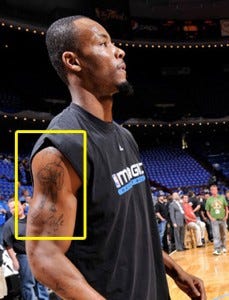Brand matters. Start-ups should think like a T-shirt company
The emotional bond with a brand is permanent…like a tattoo
The building blocks of modern programming languages, (X)aaS and the simple integration of social mean anyone can build a product or service cheaply and quickly — original or knockoff.
Good ideas will be copied so founders should leverage the technology ecosystem in hyper-efficient construction of brands that can emerge as category killers. To create significant enterprise value web start-ups need to think like a T-shirt company and build an emotional connection with the consumer that transcends the product.
In the T-shirt business, your competition has access to the same basic materials and blank shirts, the same printing and embroidery machines and the same stores for distribution. If you operated in this commodity product environment, would you stand out? If someone decided to knock-off your idea, would you keep your customers? Would you still be in business if you were selling T-shirts?
The commoditization of the technology stack means the copycats are coming. A focus on understanding the consumer and being best at the one thing they care most about is the only way to win.
At AND 1 we started with a brand thesis and used the commodity medium of T-shirts and shorts to deliver our message to the market. We focused exclusively on the ballplayer with attitude and spoke to him with every product, every ad, every piece of the AND 1 experience. We believed if we got our stuff on the backs of the most smack-talking, ankle-breaking, jump out of the gym ballers with attitude, the rest would follow.
We had to elicit emotion and connect in a way that transcended any one experience or product. (because even the best products can be copied)
We couldn’t out-spend anyone in marketing. We didn’t have the volume to compete on price. Heavier weight T-shirts in higher quality cotton and uniform quality shorts with a 3-inch waistband were our “technical” advantage. This got us in the market, but we knew the consumer better and the attitude we poured into every product allowed us to win. When NIKE and Adidas offered our $35 short for $30 and when all the MeToo brands jumped into the trashtalk T-shirt game our consumer stayed with us.
The other guys claimed to understand the consumer and they copied our slogans and our shorts, but it fell flat. We went deeper into the soul of the game. We embraced hip-hop swagger and launched the mix-tape. We were the playground brand when streetball was the brand of hoops everyone wanted to play and watch. We had NBA bound ballers tattoo our logo on their bodies while the copycats watched their stuff go on sale. Our target consumer wanted AND 1. Our brand was legit and we rode this brand legitimacy to over $200M in sales.
My experience at AND 1 taught me the power of brand and I see the next wave of massive enterprise value creation requiring brand investment. Companies need to differentiate on deep consumer insight and exceptional product experience to earn consumer love and loyalty.
Brand is as important to tech start-ups as it is to people who put ink on cotton T-shirts or sugar, flavor and color in carbonated water.
If you are building a brand, let’s talk. If you’re not, let’s talk about why not.


